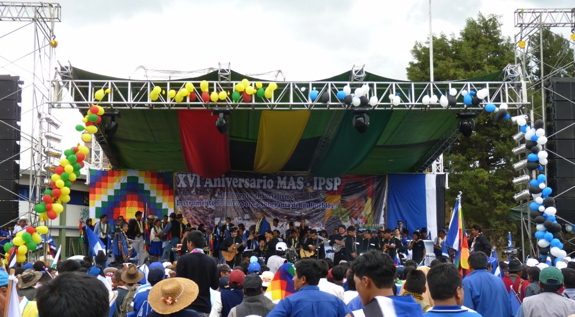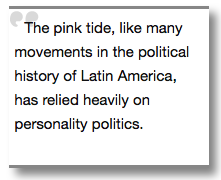
Evoism after Evo: Prospects for Transcending Personalistic Politics in Bolivia
March 25, 2016 - Brown Political Review
By Sandy Greenberg
Since first being elected in 2005, Evo Morales, Bolivia's famously football-loving president, has been scoring goal after goal. Morales' victories have been monumental: He's significantly reshaped the Bolivian constitution (for example, making Bolivia officially secular rather than Catholic), become the single dominant figure in Bolivian politics, and, as an Aymara, won recognition as the first indigenous president to be elected in the majority-indigenous nation. Furthermore, Morales, a former trade-unionist who represented Bolivia's rural colaceros (coca-leaf growers), has used his time in office to build a formidable political following for his party, Movimiento al Socialismo–Instrumento Político por la Soberanía de los Pueblos (MAS), reshaping Bolivia and Bolivian politics in light of his eclectic communitarianism. This transformation has yielded massive reductions in poverty and illiteracy among the Bolivian people, sustained a fairly equitable economic growth predicated mostly upon commodities' wealth, increased state involvement in key economic sectors (most notably hydrocarbons), emphasis on the "plurinational" nature of Bolivia, social inclusion — particularly of women, traditionally-marginalized indigenous groups, and colaceros — and geopolitical alignment with other left-leaning Latin American governments, notably those of Venezuela and Ecuador. Voters, particularly those in rural areas with large indigenous populations, have generally responded well to the direction Bolivia has taken under Morales's policies, re-electing him both in 2009 and 2014, each time with over 60 percent of the vote.
This year, however, Morales's luck seems to have run out. In anticipation of Bolivia's 2019 presidential elections, Morales sought to amend the constitution so as to allow him to run for a fourth term. The question was put to a referendum on February 21 when the Bolivian people decided, albeit by a very narrow margin, to reject the amendment, handing Morales his first real political defeat since coming to power. Although this change of fortune may seem surprising at first glance, it's not entirely without explanation. Morales has always been well-liked, in part due to his fondness for forgoing the formalities of office (he prefers, for example, colorful sweaters to suits) but his popular standing has taken a hit recently as a result of his elusive response to a personal scandal and some allegations of corruption. More broadly, he has become the Bolivian political establishment, which has stripped him of the luster he once possessed as a populist outsider. Several indigenous political groups that once supported Morales have turned against him, in part because of his perceived favoritism towards the Aymara over other indigenous peoples. To make matters worse, Bolivia has been impacted by the worldwide fall in commodity prices, leading to slower economic growth.
Despite the political setback of the referendum, however, Morales continues to enjoy strong majority approval, as reflected in opinion polls. This is particularly true among rural populations who have benefitted extraordinarily from his policies, especially his doctrine of "coca sí, cocaína no." This being the case, Bolivians appear to have denied Morales a fourth term more in an effort to prevent him from taking advantage of his commanding position to monopolize political power in the long-term than out of active dissatisfaction with his government.
Regardless of the reasoning behind the vote, the referendum's outcome puts Morales in a very interesting position. Though his time in office is limited, he is still indubitably the largest player in Bolivian politics, with three years remaining to serve as President. In other words, he has plenty of time to groom a successor from his party to continue his presidential legacy. Currently, despite its domination of Bolivian politics, MAS lacks strong leading figures other than Morales; no one else in the party has the necessary political stature to make a strong presidential candidate. Thus, all eyes are now on Morales since it is widely assumed that he will take advantage of his remaining time and political capital to select a colleague to prepare for his succession. In this sense, some have called Morales' situation more of an opportunity than a true defeat. After all, even if he had been permitted to run for a fourth term and won, every political movement must be passed on to the next generation of leaders at some point. Eventually, Morales would have had to support to a successor candidate, and had he won the referendum, he may have wound up having to do so under less desirable circumstances.
Had Morales succeeded in the referendum, the situation in Bolivia could have been analogous to that of another "pink tide" state, Venezuela, where a very similar referendum actually succeeded. In 2009, Venezuelan president Hugo Chávez secured passage of a constitutional amendment abolishing presidential term limits. This change allowed Chávez to run for a fourth term in 2012, an election he comfortably won. Chávez, however, died of cancer the following year. After his death, a special election saw the victory of Chávez's vice president and handpicked successor, Nicolás Maduro. Yet, just months into his tenure, it became clear that Maduro was not sufficiently prepared to succeed Chávez as president.
The pink tide, like many movements in the political history of Latin America, has relied heavily on personality politics, and no one embodied this principle more than the ever-charismatic Chávez. Believing in the possibility of himself governing for perpetuity, Chávez had little incentive to develop his party, the PSUV, into an entity which existed independently of his leadership until his diagnosis. At that point, the process of preparing a successor — Maduro — was necessarily hurried; Maduro was only appointed vice-president about a year before Chávez's death. Even then, it was not clear for some time that he was intended as a successor — likely out of quixotic hope for recovery and paranoia over potential challengers, Chávez didn't do much to develop Maduro as a national figure until the very end. Subsequently, Maduro largely failed to maintain the strong social support for the chavismo program. There is no doubt that this change in popular opinion was primarily due to precarious economic conditions; however, Maduro's noted charisma-deficit certainly didn't help. During his life, Chávez had been able to rely on his personal store of political capital to mitigate political setbacks; Maduro, in part because Chávez invested little in preparing him, generally lacks this option.
In Bolivia, a similar scenario could have easily unfolded. If Morales had won the referendum, he would have likely been reelected in 2019; therefore, he would have had no incentive to change MAS from an organization centered on his personal appeal to a true political movement with alternative potential leaders who possess their own political capital. In this way, the referendum defeat can be construed positively at least for Morales' legacy, if not for Morales himself. It gives the incumbent president an incentive to actively prepare a successor within MAS with, insofar as Morales will still be president for three years, ample time to do so.
 Nevertheless, choosing a successor may prove very difficult for Morales. For starters, he lacks a wide array of intuitive candidates from which to choose. His vice-president, Álvaro García Linera, though eminently capable and in possession of a decent national image, is probably a non-starter — he's ideologically to the left of Morales, often perceived as more professor than politician (he was, in fact, trained as a mathematician), more urbane than folksy; he is also not of indigenous descent. Moreover, he's been saying that he wants to retire. There are a lot of other Aymara or Quechua-speaking politicians in MAS, who share Morales' humble beginnings and common touch, but none have built the national profile that Linera has, let alone that of Morales.
Nevertheless, choosing a successor may prove very difficult for Morales. For starters, he lacks a wide array of intuitive candidates from which to choose. His vice-president, Álvaro García Linera, though eminently capable and in possession of a decent national image, is probably a non-starter — he's ideologically to the left of Morales, often perceived as more professor than politician (he was, in fact, trained as a mathematician), more urbane than folksy; he is also not of indigenous descent. Moreover, he's been saying that he wants to retire. There are a lot of other Aymara or Quechua-speaking politicians in MAS, who share Morales' humble beginnings and common touch, but none have built the national profile that Linera has, let alone that of Morales.
However, if Morales wishes to perpetuate his legacy and the policy program of MAS, the timing of his decision to pick a successor could not be more critical. Already, the Bolivian government has lost an ally in Argentina, where the transfer of power from the left-leaning Cristina Fernández de Kirchner to Mauricio Macri brought swift and radical neoliberal policy-changes. A second ally is on the way out, with Ecuadorian president Rafael Correa signaling his retirement. Morales' other significant allies, including the Maduro government in Venezuela, and to some extent the Rousseff government in Brazil, are significantly weakened. In this context, a single lost presidential election could pose an existential threat to the MAS legacy. There is no guarantee that Morales will get this right — no guarantee even that MAS will ever be able to exist as a self-sustaining and coherent (rather than strictly personality-driven political) entity. However, Morales has the time, and now also the correct incentive. With this in mind, he must focus on quickly establishing and grooming a successor within MAS if he wants to turn his recent referendum defeat into yet another political success story.